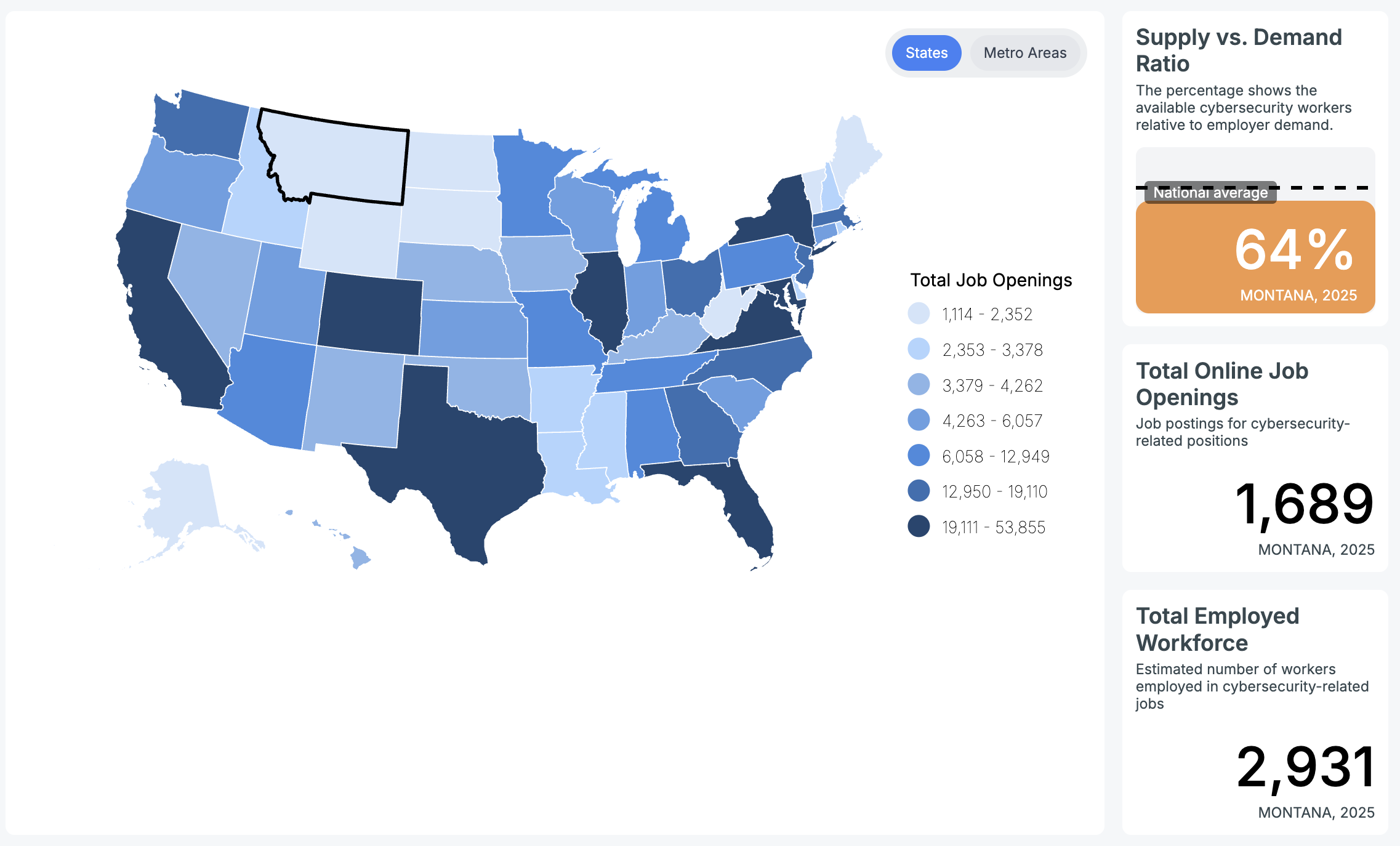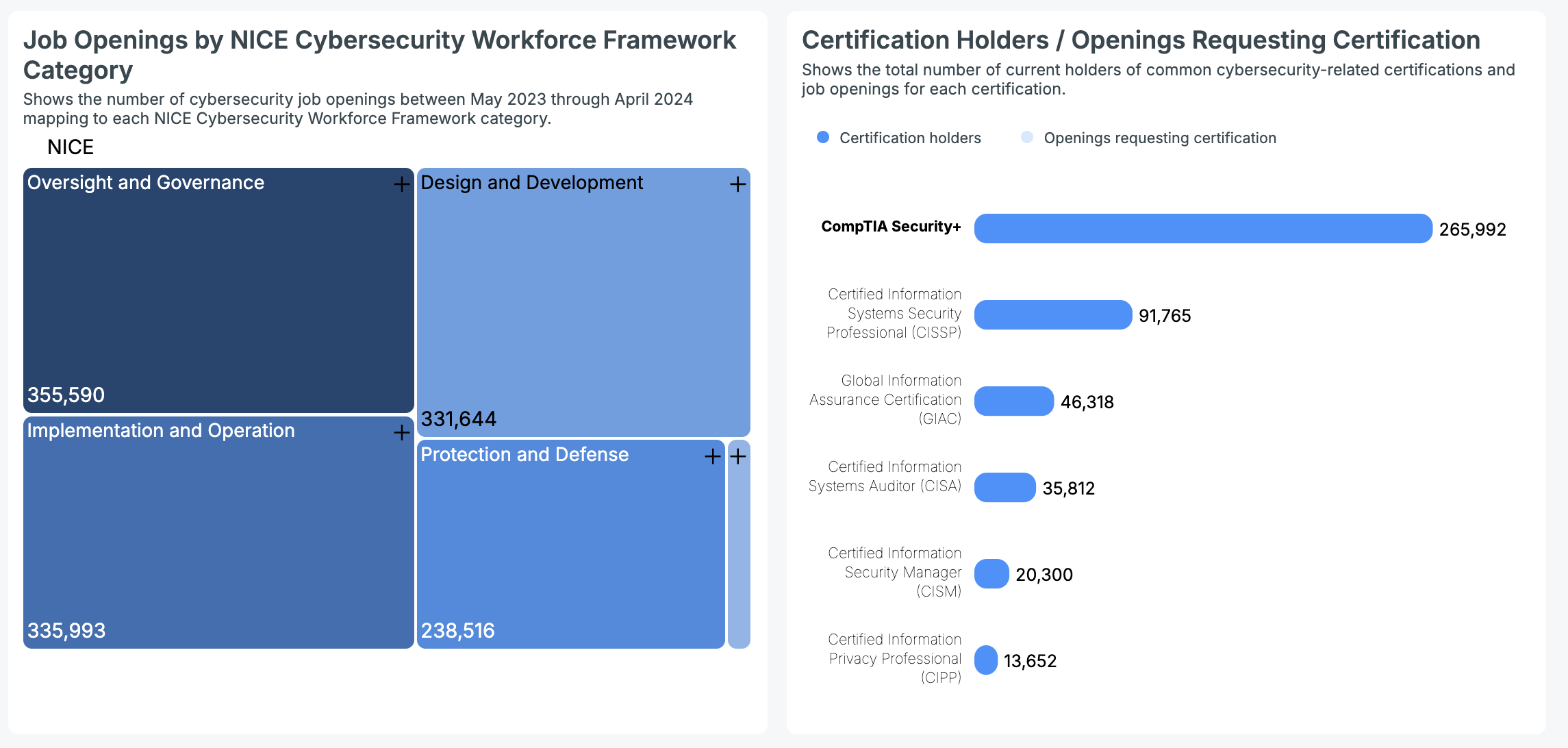- Organizations
- Associate degrees
- Bachelor’s degrees
- Cybersecurity certifications
- Cybersecurity jobs
- Cybersecurity degree programs
This guide outlines information about cybersecurity schools in Montana, as well as some of the economic retooling that is happening as the state begins to focus on cybersecurity.
Montana is a state in transition. Historically, the mainstays of Montana’s economy were based on the state’s abundance of natural resources and wide-open spaces.
Ad
cybersecurityguide.org is an advertising-supported site. Clicking in this box will show you programs related to your search from schools that compensate us. This compensation does not influence our school rankings, resource guides, or other information published on this site.
Featured Cybersecurity Degree Programs
| School Name | Program | More Info |
|---|---|---|
| Southern New Hampshire University | Online BS in Cybersecurity or Online MS in Cybersecurity | website |
| Eastern Oregon University | Online BS in Cybersecurity | website |
| Grand Canyon University | Online BS in Cybersecurity or Online MS in Cybersecurity | website |
| UC Berkeley School of Information | Master’s in Cybersecurity | No GRE/GMAT Required | website |
| Purdue Global | Online BS in Cybersecurity | website |
This means that jobs and opportunities in agriculture, ranching, and mining dominated the top of the economic charts.
But today, the new staples of Montana’s economy are emerging. While economic sectors like agriculture, ranching, and mining are slowing down — new forms of economic growth are filling the gaps and beginning to grow in their own right.
In the last ten years, the leading uptrends in Montana’s economy, according to the Montana Department of Labor and Industry, are in the financial and healthcare sectors.
A breakdown of nationwide U.S. cybersecurity job openings from May 2023 to April 2024 highlights key areas of demand.
Oversight and Governance dominated with 355,590 positions. Other significant categories included Implementation and Operation (335,993), Design and Development (331,644), and Protection and Defense (238,516). Investigation roles totaled 19,525.

Overall, the number of jobs in Montana has not increased dramatically year-over-year. But that does not tell the whole story.
The job market is retooling and matching nationwide workforce trends of increased healthcare and information/knowledge worker demand.
But where does cybersecurity fit into all of this? The short answer is that while Montana does not have a massive technology sector when compared to other states — there still are opportunities for well-trained cybersecurity professionals, and given the other economic trends and indicators, cybersecurity roles will continue to grow.
This guide is intended as a brief overview of cybersecurity in Montana including some of the educational and career opportunities available in the field.
Like many other states, Montana is developing cybersecurity resources at the state level.
Organizations and resources
Led by Montana’s State Information Technology Division, the goal of the state-funded initiative is to figure out the right way to train the cybersecurity workforce of the future.
The organization operates as an advisory board and as a resource for Montana’s budding cybersecurity community.
One of the group’s recent initiatives was to create and lead a program called the Montana Girls Cybersecurity Project, which was intended to increase the overall diversity and perspectives of the local cybersecurity industry.
Montana is once again collaborating with the SANS Institute to support unique student initiatives.
CyberStart America provides high school students with a complimentary and engaging chance to acquire cybersecurity expertise and become eligible for the National Cyber Scholarship Competition.
For college students, Cyber FastTrack streamlines and hastens their journey to a lucrative and sought-after profession. High-performing qualified participants will have the opportunity to apply for cybersecurity training scholarships valued at $3,000.
Additionally, Montana’s State Information Technology Division also advises other officials and organizations within the state about emerging cyber and digital threats and the best practices to try and deal with them.
While there are only a few cybersecurity degrees and certification programs available in Montana when compared to other states, there are still a few local options.
And, given the trend toward online degree offerings and the general improvement of online learning options, geographical proximity to colleges and universities becomes less important.
One starting point for a career in cybersecurity is obtaining an associate’s degree.
Cybersecurity associate degrees in Montana
An associate degree is good career preparation in that it gives students a basic understanding of fundamental cybersecurity concepts and helps them prepare for obtaining industry certifications in the future.
There is currently one campus-based associate degree in cybersecurity offered by Missoula College, which is a two-year college that is affiliated with the University of Montana.
Students completing the curriculum earn an Associate of Applied Science degree in information technology and cybersecurity with a concentration in network administration and security.
Courses in the program include coding, data analysis, server administration and operating systems, networking devices, IP routing, and cybersecurity fundamentals.
Another aspect of Missoula College’s cybersecurity associate’s degree in cybersecurity is that it prepares students to take a number of industry certification exams including CISCO Networking I and CompTIA Security+.
Additionally, there is an internship requirement, which will help students obtain valuable knowledge and experience within the field.
An associate’s degree is a great way to start preparing for a career in cybersecurity and working toward the credit hours needed for a bachelor’s degree in cybersecurity.
Related resources
Cybersecurity bachelor’s degrees in Montana
A bachelor’s degree in cybersecurity is considered a foundational component of a cybersecurity skillset.
The number of credit hours required to get a bachelor’s degree (usually 120 credit hours) means that students with the equivalent of a four-year degree are well-versed in computer coding, software development, and network/data infrastructure skills necessary to perform more advanced cybersecurity work.
For now, the University of Montana is home to the state’s only standalone cybersecurity degree. The degree is a program that builds on the associate’s degree in network administration and security offered at Missoula College.
Students who complete the associate’s degree and related training can apply to continue in the bachelor’s program that is run in partnership with Missoula College, the University of Montana, and Excelsior College.
All of the hours necessary to earn a bachelor’s degree in cybersecurity from the University of Montana can be completed on campus.
The two years of credit hours, in addition to the associate’s degree credits, cover general education requirements as well as supplemental cybersecurity courses.
Like the associate’s degree offered by Missoula College, the cybersecurity bachelor’s program builds the fundamental skills necessary to prepare for a career, including professional cybersecurity certification preparation and work experience in the form of internships.
Cybersecurity certifications in Montana
According to Cyberseek’s nationwide data, here are the current numbers for professionals holding common cybersecurity certifications:
- CompTIA Security+: 265,992 certification holders
- CISSP: 91,765 certification holders
- GIAC: 46,318 certification holders
- CISA: 35,812 certification holders
- CISM: 20,300 certification holders
- CIPP: 13,652 certification holders

In addition to the associate’s and bachelor’s degree programs available at the schools affiliated with the University of Montana, there are also two cybersecurity certification programs available.
Missoula College has two campus-based certification programs that are derived from a subset of courses that make up the associate’s degree programs outlined above. The goal of this certification program, according to the university is to give students a baseline cybersecurity background.
“The curriculum is based upon the Core Knowledge Units developed by the National Security Agency (NSA) and the Department of Homeland Security (DHS). Students will gain skills in basic data analysis, programming, networking concepts, IT systems components, system administration, fundamental security design principles, cyber-threats and cyber-defense, cryptography, and policy, legal, ethics, and compliance.”
Students completing the program will earn a certification of technical skills in cybersecurity or a certificate of technical studies in cybersecurity (depending on what courses are completed).
There is a shortage of cybersecurity workers nationwide and Montana is no different. While the state is not necessarily home to any of the large employers or large industries — such as military contracting, aerospace, or information technology companies — Montana, like everywhere else, does still need to have a well-trained cybersecurity workforce.
Cybersecurity jobs in Montana
According to Cyberseek‘s data, Montana has about 1,689 cybersecurity job openings. For comparison, roughly 2,931 people are currently employed in cybersecurity-related roles in the state.
Other noteworthy Montana cybersecurity employment statistics include:
- Missoula region has a very high supply of workers ratio: the national average is 74 percent and Missoula at 83 percent.
- Great Falls region has a medium supply of workers ratio: the national average is 74 percent and Great Falls at 75 percent.
- The Billings region has a low supply of workers ratio: the national average is 74 percent and the Billings is at 66 percent.
Some of the top job titles for cybersecurity positions in Montana include:
- Cybersecurity engineer
- Cybersecurity analyst
- Penetration tester (or ethical hacker)
- Cybersecurity manager/administrator
- Network administrator/engineer
According to the latest Bureau of Labor Statistics data, the hourly average wage for a security analyst in Montana was $41.87, while the average annual salary for the same position was $87,100.
While not historically known for its technology scene, Montana is a state that is transitioning its economy.
As the internet and digital technologies increasingly become part of everyday life for people everywhere, cybersecurity will continue to be in demand — and a skilled workforce, regardless of location, will be needed to fill those positions.
Through its training and education programs at Montana’s colleges and through state-level initiatives that are aimed at training the next generation to guard against cybersecurity threats, the state is providing unique opportunities for people with digital skills.
Cybersecurity degree programs in Montana
- Program: Associate of Applied Science in Information Technology and Cybersecurity
Credits: 63-64
Cost per credit: $123 in state | $470 out of state
Delivery method: Campus
Program highlights:- Goal: They work closely with businesses to get students ready for the global job market, teaching current business trends.
- Teachers: Experienced professionals who focus on hands-on learning to help students adapt to a changing world.
- Missoula College provides student support like advising, tutoring, study workshops, and services for those with disabilities.
- Program: Bachelor of Science in Cybersecurity
Credits: 120
Cost per credit: $978
Delivery method: Campus
Program highlights:- Relevant and rigorous curriculum
- Skills-based learning and general education
- Internships with local high-tech companies
- Program: Cybersecurity Certificate of Technical Skills (CTS)
CAE designation: CAE-CD
Credits: 12
Cost per credit: $118 in state | $272 out of state
Delivery method: Online
Program highlights:- NSA Recognition: Missoula College's cybersecurity program is approved by the National Security Agency (NSA).
- Program Details: It can lead to advanced degrees and prepares students for two important industry exams: CompTIA Security+ and CompTIA Network+.
- Skills Gained: Students will learn professional behavior and teamwork in cybersecurity, legal and ethical aspects of security and techniques to protect computer systems.
- Program: Cybersecurity Management Certificate
Credits: 18
Cost per credit: $239
Delivery method: Campus
Program highlights:- Program: Teaches students about different areas of cybersecurity.
- Foundation Course: Network basics, security management, and system administration.
- Capstone Course: Advanced network and security management.